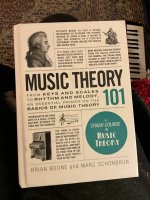It was also good to learn about modes and modal scales. Not that I could rattle off each modal scale on the spot this second, or anything like that, but many of the world folk genres I play are loaded with tunes that are modal rather than straight major or minor. Modal scales pre-date the advent of classical Western harmony, but endure in the traditional music of Eastern Europe, Scandinavia, Ireland/Scotland/UK, pre-bluegrass American oldtime genres, and elsewhere. Lots of medieval and Renaissance music is modal too. This sound has antecedents and links in the music of the Middle East, India/Pakistan, and Africa. I've lost count of the times in workshops, classes, or trad sessions that I've heard people say a tune sounds "weird" to them and "doesn't fit" their paradigm of major or minor. This is because the person's ear hasn't yet been exposed to the modal genres some of us live for. This was all super-interesting and helpful to learn about.

